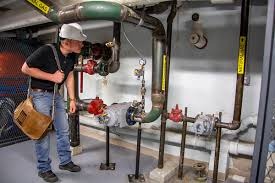A gas leak can be a terrifying situation, posing a serious health risk and even the potential for an explosion.
Fortunately, if you live in New York City, there’s a law in place that helps keep you and your loved ones safe: Local Law 152. This legislation mandates regular inspections of gas piping systems in most buildings, significantly reducing the risk of gas leaks and promoting overall apartment safety.
But what if you’re concerned about your gas line even before the mandated inspection cycle? In such cases, you can take proactive steps by getting a gas line inspection from a qualified licensed plumber.
What is Local Law 152 Gas Inspection?
Enacted in 2016 and implemented in 2019, Local Law 152 requires building owners in NYC to have their gas piping systems inspected every four years. These inspections are vital for identifying potential problems and making sure gas pipeline operations are safe throughout the building.
Why is NYC Local Law 152 Important?
Natural gas, while convenient for heating and cooking, can be dangerous if not handled properly. Leaks can cause a variety of issues, including:
Carbon monoxide poisoning: This odorless gas can be lethal if you inhale it in high concentrations. Signs of carbon monoxide poisoning include headaches, nausea, dizziness, and even unconsciousness.
Fire and explosions: Leaking gas can accumulate in enclosed spaces and create a significant fire hazard. If an ignition source is present, like a spark from an appliance or electrical outlet, a devastating explosion could occur.
By requiring regular Local Law 152 inspections, the city of New York helps prevent these dangers before they happen. Licensed plumbers with expertise in gas line systems conduct the inspections, searching for leaks, corrosion, and other potential issues. They also ensure that all gas installations comply with current safety codes.
Who is Responsible for Local Law 152 Compliance?
The responsibility for complying with Local Law 152 inspection falls on building owners. They are required to:
- Schedule inspections every four years according to their building’s designated cycle.
- Hire a qualified licensed master plumber or someone working under their direct supervision with the necessary training to conduct the inspection.
- Facilitate access to all gas piping for inspection.
- Address any deficiencies identified in the inspection report within the allotted timeframe.
What Happens During a Local Law 152 Inspection?
A qualified Local Law 152 plumber will perform a thorough inspection of the building’s gas piping system, which typically includes:
- Visual inspection: The plumber will examine all exposed gas pipes for signs of damage, corrosion, leaks, or improper connections.
- Leak detection: Specialized equipment will be used to check for any gas leaks, even if they are small or undetectable by smell.
- Pressure testing: The gas lines will be pressurized to identify any weaknesses or potential leaks in the system.
- Appliance checks: The plumber will ensure that all gas appliances are properly connected and functioning safely.
What to Do After a Local Law 152 Inspection
Following the gas line inspection, the plumber will provide a Gas Piping System Periodic Inspection Report (GPS1) to the building owner. This report details the findings of the inspection, including any deficiencies or repairs that need to be made.
- If the report shows no problems: You can breathe a sigh of relief! Your gas piping system is in good working order. The building owner will need to submit an Inspection Certification (GSP2) to the NYC Department of Buildings (DOB) within 60 days to confirm compliance.
- If the report identifies deficiencies: The building owner has 120 days to address the necessary repairs and ensure his New York City apartment safety. Once the repairs are complete, a signed and sealed GSP2 form must be submitted to the DOB.
What Can You Do as a Tenant?
While the responsibility for compliance falls on building owners, you can also play a part in ensuring your safety:
- Be aware of Local Law 152: Knowing about this law empowers you to ask your landlord if your building has undergone the required gas piping inspection.
- Report any gas concerns: If you suspect a gas leak in your apartment or anywhere in the building, report it to your landlord immediately. Don’t hesitate to call the National Grid emergency gas line at 1-800-49N-GAS (1-800-496-427) if the situation seems urgent.
- Schedule your own gas appliance inspection:
Even if your building is compliant with Local Law 152, consider having your gas appliances inspected by a qualified plumber. This will provide added peace of mind.
Finding Qualified Local Law 152 Plumbers for Gas Line Inspections
When seeking a plumber for a gas piping inspection or appliance maintenance, make sure they possess the necessary qualifications:
- Licensed Master Plumber: Look for a plumber with a valid Master Plumber license issued by the NYC Department of Buildings (DOB). This guarantees they have the expertise and experience to handle gas systems safely.
- Experience with Gas Lines: Inquire about the plumber’s experience, specifically with gas line inspections and repairs.
By following these tips and staying informed about Local Law 152, you can enhance the safety of your NYC apartment and ensure peace of mind for yourself and your family.
Remember, even though Local Law 152 mandates inspections, taking proactive steps like getting a gas line inspection or installing gas detectors demonstrates a commitment to prioritizing safety in your living space.
